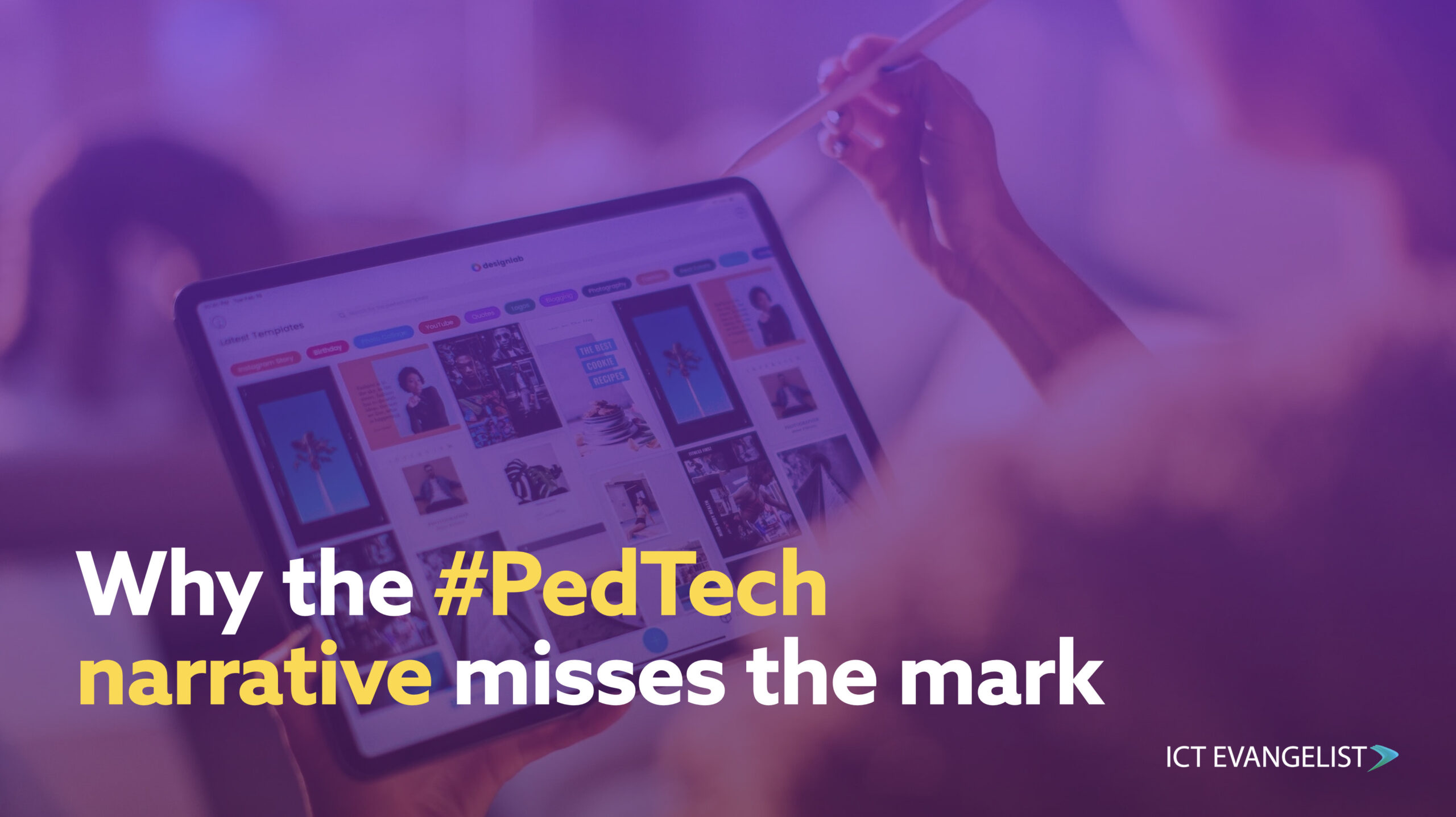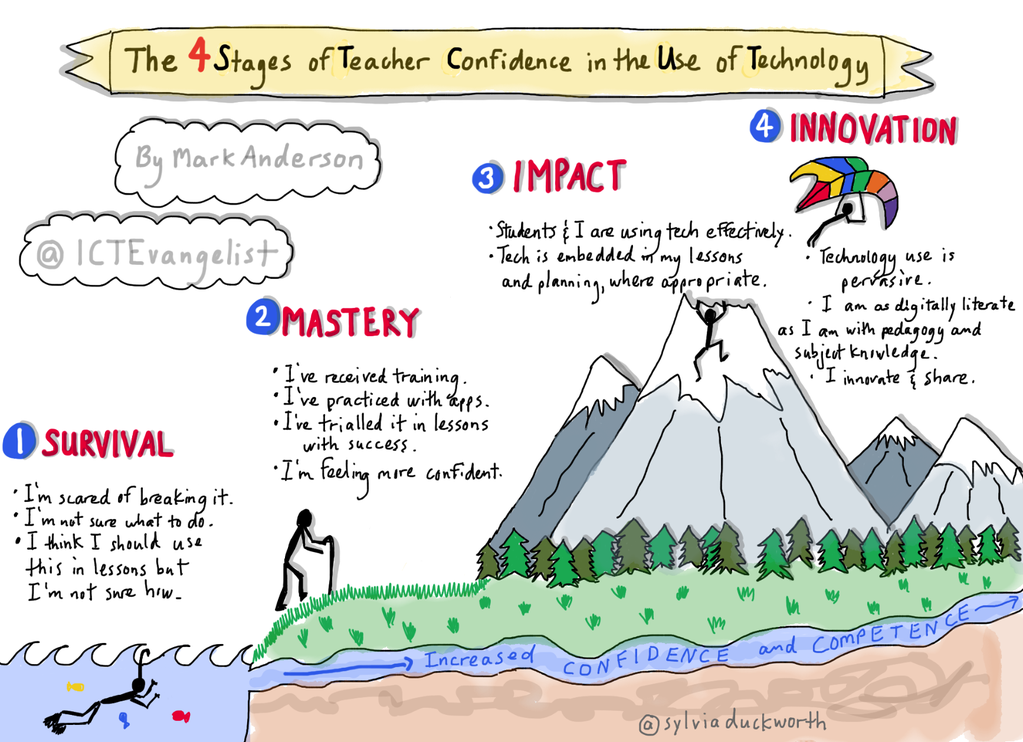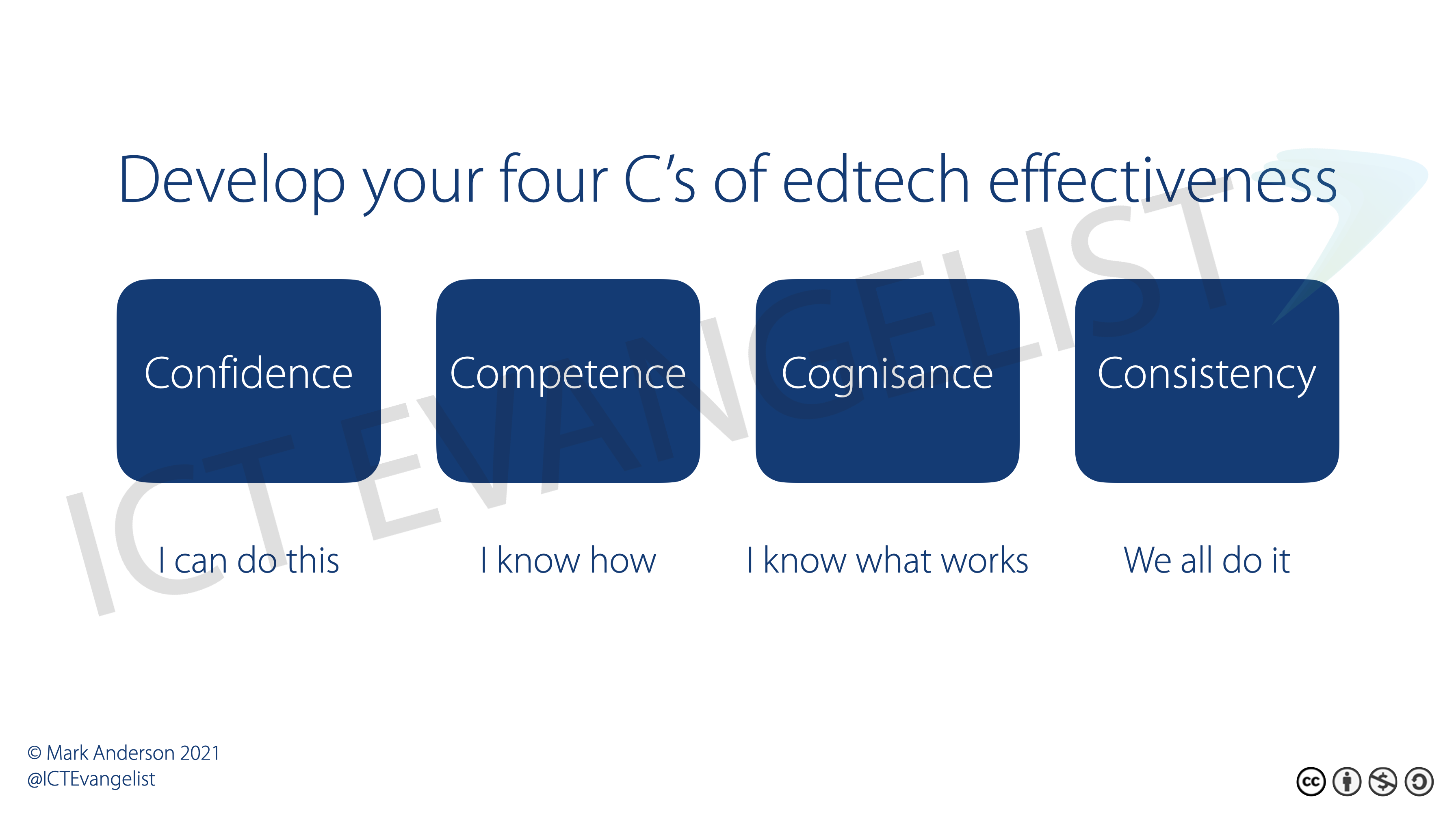
There are a few people who won’t like what I’m going to say in this post, some may even see it as a personal attack, but it isn’t.
I’ll start by saying, I have respect for the person who coined the phrase, @FionaAS. For those who know me and my work over the past few decades, you’ll know how much of a champion I am for pedagogy-informed uses of technology in the classroom. It’s something I am known for and have always shared with the 1000+ schools and 20,000+ teachers I’ve worked with since leaving the classroom in 2015 and across my 20+ years as a serving teacher and senior leader.
In her 2021 article, “Forget edtech, we need to talk about ‘pedtech’” Aubrey-Smith challenges us to “change your narrative from education to pedagogy” – and sure, I get it – taking just one of many articles I’ve written such as “IT’s about teaching and learning” from 2017, our viewpoints are clearly aligned in the why of why it is important to prioritise pedagogy first and technology second.
It’s not just me… “I know it’s been said many times before, but it’s worth saying again. Learning should always come before technology.” quote from Steve Wheeler (2014) in his post: “Learning first, technology second”.
So what’s the problem?
The phrase ‘Pedtech’ is a canny one. It’s catchy, and it builds upon a great narrative, not just from Aubrey-Smith who makes a compelling case for the use of the term but from the many who’ve come before her. From Fullan to Twining and Maher, to the Education Endowment Foundation.
Interestingly though, it is all about context. Aubrey-Smith quotes the super useful EEF report in a variety of places with the quote, “Technology must be used in a way that is informed by effective pedagogy” however I see that as a misquote. The capitalisation of ‘Technology’ makes you think that’s the exact quote. It isn’t. The quote comes in mid-sentence. The full quote comes from this paragraph:
“The most enduring of these messages is that to improve learning, technology must be used in a way that is informed by effective pedagogy. The question of how to use technology to improve learning is not distinct from the question of how to teach effectively, or of how children learn. That is why, in addition to providing an overarching framework for considering how technology is best used in the classroom (Recommendation 1), this report has been structured around some of the key elements of effective teaching: explanations and modelling (Recommendation 2); pupil practice (Recommendation 3); assessment and feedback (Recommendation 4).”
The subtle, yet important difference is of course, that we are talking about technology in the classroom that supports and enhances learning. We are not, talking about technology across the entirety of your school organisation.
Why is this important?
The distinction is important, and please, do not get me wrong. I reassert, teaching and learning with technology is too important (and expensive) to leave to chance.
So, sure, Aubrey-Smith is right to focus on pedagogy when it comes to improving the use of technology in the classroom. This isn’t a new thing. As I’ve long advocated for, building on the work of Mandinach and Cline (1992)…

…it is imperative to support teachers in developing their confidence and competence in their use of technology. It’s more than just confidence and competence though when it comes to improving and developing systemic change in an organisation.

‘Pedtech’, as I see it, informs a niche of what needs to be explored across your IT estate in education. It’s a nice ‘hook’ to help teachers frame their evidence-informed thinking and practice with technology, but it is no more than that. A hook. As you’ll see below, it’s being advocated as a catch-all for all technology in an educational setting.
Aubrey-Smith shares:
“When we talk about EdTech, we are talking about technologies used in education. These include:
- technologies used for teaching (e.g. online classrooms, video-calls, content management, assignments, curriculum delivery)
- technologies used for learning (e.g. creation software, formative assessment, communication tools)
- technologies used for school administration (e.g. MIS, timetabling, parent/staff communications)
- technologies used to underpin all the above (e.g. devices, infrastructure).
When we talk about EdTech, our conversation is framed around two things: education and technology. By education, we are drawn to think about the systems and processes involved in education – content delivery, reporting, marking, evidencing, admin. By technology, we are drawn to think about software and hardware that support those systems and processes.
Conversations about EdTech are framed by systems and processes.
These are actions, behaviours and pedagogies that we can learn, be trained to enact, and that we can incorporate or replicate in our own practices.
PedTech turns this on its head.
With PedTech we start by thinking about pedagogical intentions.”
And this is the problem I have.
Technology in education isn’t just about its use in the classroom, sure it’s important, but it’s part of a bigger landscape, which is why I see this as niche and a nicely packaged and subsequent marketing of a way of sharing about teaching and learning with technology.
So what?
Firstly, this isn’t anything actually new. The framing is something that has been long shared and appears, for all intents and purposes, to be the edtech equivalent of the Emperor’s new clothes. Teachers need technological knowledge so they can make informed choices on how to apply that with their pedagogical and content knowledge (TPACK).
Secondly, it’s taking away the significance of having the very important macro view of your IT across the whole of your educational setting. This is because it’s correct at a system level to look at things at a system level and implementation is a devil to get right.
So, when we’re thinking about our door-access systems, do we need to explore that through the lens of a shared pedagogy, through a lens of ‘Pedtech’? How about when we’re considering our digital signage and its positioning, or how investing in energy-saving technology can reduce our energy costs across a school or Trust? What about when we look at CCTV or the school website or the use of safeguarding software to improve the record-keeping of the DSL? Of course not – because it has little to do with learning or teaching.
See what I mean?
Technology in educational organisations is far-reaching, well beyond that which we find in the classroom. In fact, technologies used in schools by key stakeholders such as our bursars, finance managers, HR staff, and office administrators have been used effectively and with great impact for some considerable time.
Here’s an example, if you’re ever looking to get your head around data analysis in spreadsheet software, speak with any of the stakeholders mentioned above and they’ll have you working with conditional formatting, pivot tables and scenario manager quicker than you can say ‘VLookup’.
Of course, technology in the classroom has the potential to improve standards, reduce workload, raise aspirations and so much more besides. If the COVID-19 pandemic had happened 20 years ago, if it wasn’t for technology, we’d never have been able to continue with teaching and learning as we did during all of the various lockdowns.
So sure, learning and teaching are important and it does need a lens which informs professional learning, implementation, successful use, and supporting colleagues so that they can move from Survival to Impact and Innovation on Mandinach and Cline’s scale, but… for everything? No. Pedtech at best is a niche which is already well served, written about, explored and impactful approaches shared which, coupled with the aforementioned need to look at leadership from a macro lens rather than a micro one, for whole school impacts and ROI to be seen, we need edtech to stay edtech with, quite rightly, pedtech in its place, firmly in the classroom.
I welcome more research into what works with technology to support learning and teaching and the ways in which technology can help to reduce workload, improve learner metacognition, support distraction reduction, well-being, life skills, online safety and more. I am keen to learn how developing systems such as AI classroom assistants such as Merlyn can speed up processes, and reduce interactions and steps required with technology to help teachers and learners, but ‘Pedtech’? Sorry, but whilst I applaud anyone for sparking further focus and conversation around pedagogically-informed uses of technology for teaching and learning, and it’s a debate worth having, let’s not lose focus of the bigger picture, because that’s what it is, a bigger picture.














